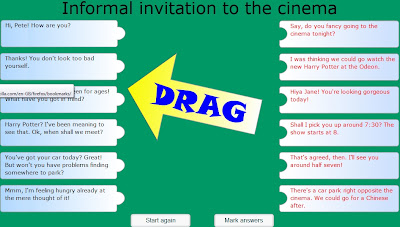This supersedes the version here:
http://aclil2climb.blogspot.com/2009/08/dialogue-quiz-invitation-to-cinema-int.html
This dialogue has a handful of common expressions, which, however, may be unfamiliar to some learners. Try to do the quiz before looking at the explanations below.
gorgeous - an adjective, used for saying something is wonderful or someone is very beautiful, e.g. these prawns are absolutely gorgeous!
You don't look too bad yourself - it'd have meant the same if Jane had said, 'You look good, too.' Here, basically, Jane is politely returning the compliment. She's saying, 'Thank you, but look at yourself - you look good, too.'
Say - an interjection used to get someone's attention before you say something.
fancy - this is used a lot in informal setting. It means 'feel like' or 'want to'. Notice the -ing form. "Do you fancy some ice cream?" "What do you fancy doing this evening?"
ages - a long time. The more correct form would be 'I haven't been to the cinema for ages!' but 'to the cinema' is understood in the conversational context, so it was left out.
What have you got in mind? - What are you thinking of? What plans/ideas have you got? What do you want to do?
thinking, meaning - stative verbs don't normally take an -ing form, but compare the meanings of these examples:
I think it'll be a good film (My opinion is that it will be a good film)
I'm thinking of cutting my hair (I have this idea, and this is to cut my hair, although I haven't really decided yet)
Gorgeous means very beautiful (gorgeous can be replaced by the word very beautiful, i.e. they have the same meaning)
I've been meaning to call you (My intention was to telephone you)
shall - Although it's becoming uncommon, it is still used quite often in British English for offers, suggestions, requests for instructions, and requests for advice:
What shall I cook for lunch? Not: What will I cook for lunch?
Shall I carry your bag? Not: Will I carry your bag?
When shall we meet? - Jane is asking for instructions. Could she have said: 'When will we meet?' Yes, though here it would imply that Pete had no idea before, and he would be making a spontaneous decision.
great - has several meanings, but here it is used to express pleasure.
We could go for a Chinese after - What Pete means is that he has the idea of going for a Chinese meal after the show. Again, 'the show' is understood, so it was omitted.
mere - used for emphasis. Just thinking about the Chinese food has already made Jane feel hungry.
half seven - In spoken British English, people often say ‘half one’, ‘half two’ etc, which has the same meaning as ‘half past one’ and ‘half past two’.


No comments:
Post a Comment
Note: only a member of this blog may post a comment.